The AMD Ryzen 5 1600X vs Core i5 Review: Twelve Threads vs Four at $250
by Ian Cutress on April 11, 2017 9:00 AM ESTGPU Tests: Civilization 6 (1080p, 4K)
First up in our CPU gaming tests is Civilization 6. Originally penned by Sid Meier and his team, the Civ series of turn-based strategy games are a cult classic, and many an excuse for an all-nighter trying to get Gandhi to declare war on you due to an integer overflow. Truth be told I never actually played the first version, but every edition from the second to the sixth, including the fifth as voiced by the late Leonard Nimoy, it a game that is easy to pick up, but hard to master.
Benchmarking Civilization has always been somewhat of an oxymoron – for a turn based strategy game, the frame rate is not necessarily the important thing here and even in the right mood, something as low as 5 frames per second can be enough. With Civilization 6 however, Firaxis went hardcore on visual fidelity, trying to pull you into the game. As a result, Civilization can taxing on graphics and CPUs as we crank up the details, especially in DirectX 12.
Perhaps a more poignant benchmark would be during the late game, when in the older versions of Civilization it could take 20 minutes to cycle around the AI players before the human regained control. The new version of Civilization has an integrated ‘AI Benchmark’, although it is not currently part of our benchmark portfolio yet, due to technical reasons which we are trying to solve. Instead, we run the graphics test, which provides an example of a mid-game setup at our settings.
At both 1920x1080 and 4K resolutions, we run the same settings. Civilization 6 has sliders for MSAA, Performance Impact and Memory Impact. The latter two refer to detail and texture size respectively, and are rated between 0 (lowest) to 5 (extreme). We run our Civ6 benchmark in position four for performance (ultra) and 0 on memory, with MSAA set to 2x.
For reviews where we include 8K and 16K benchmarks (Civ6 allows us to benchmark extreme resolutions on any monitor) on our GTX 1080, we run the 8K tests similar to the 4K tests, but the 16K tests are set to the lowest option for Performance.
MSI GTX 1080 at 1920x1080

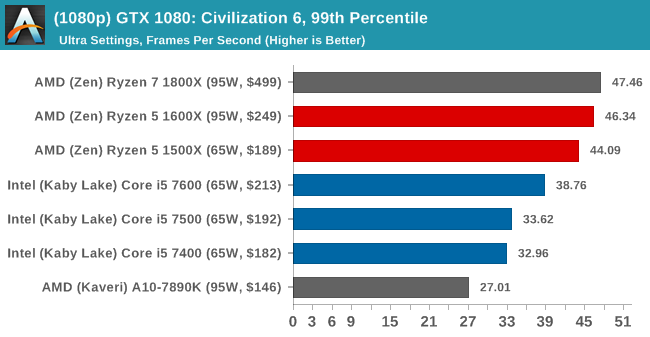
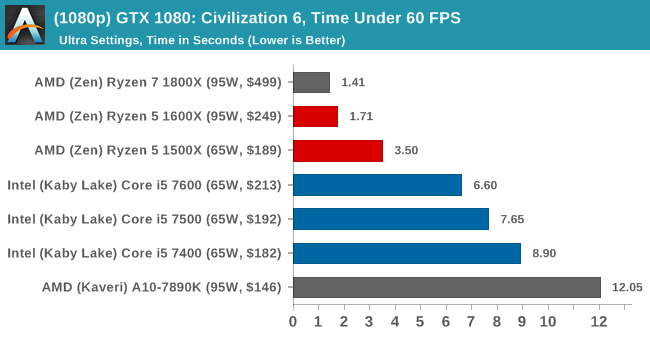
MSI GTX 1080 at 4K
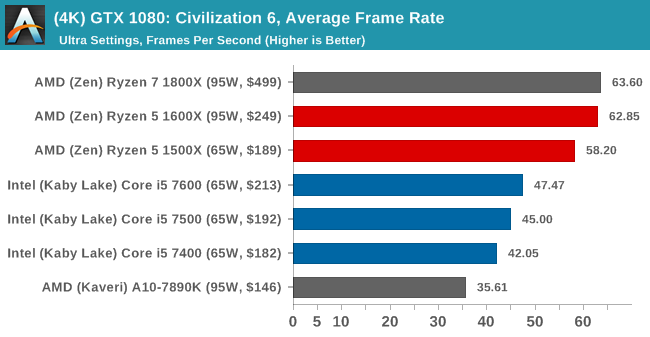
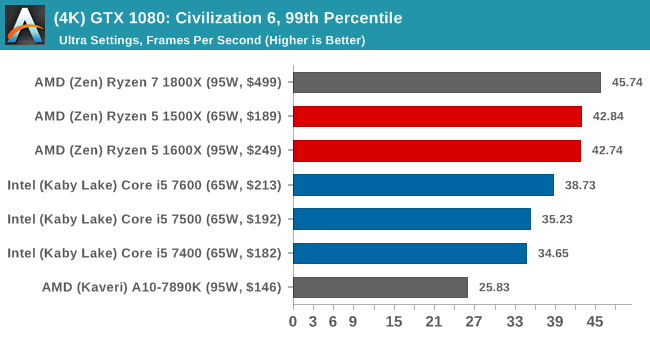 >
>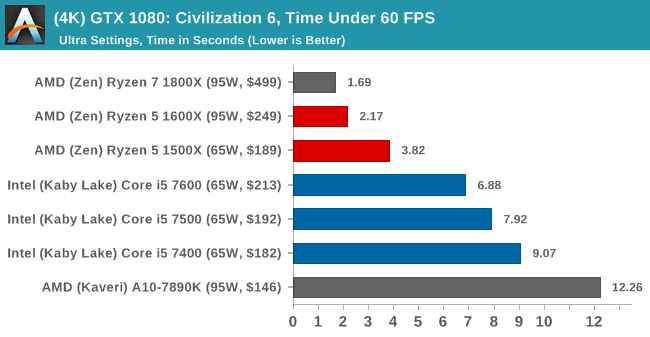
ASUS GTX 1060 at 1920x1080
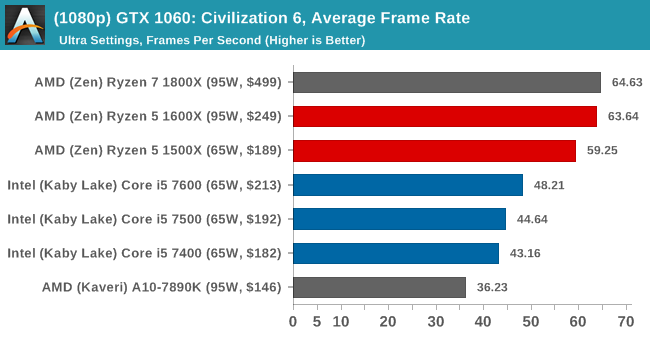
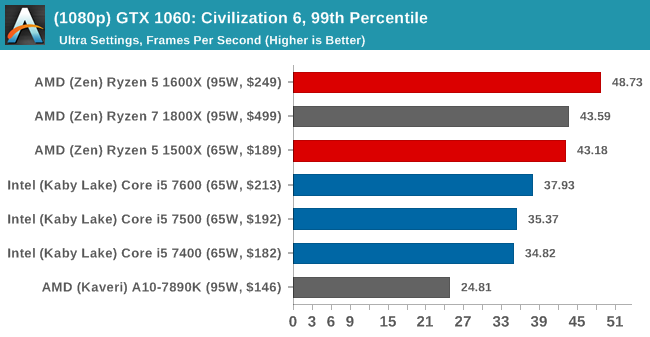
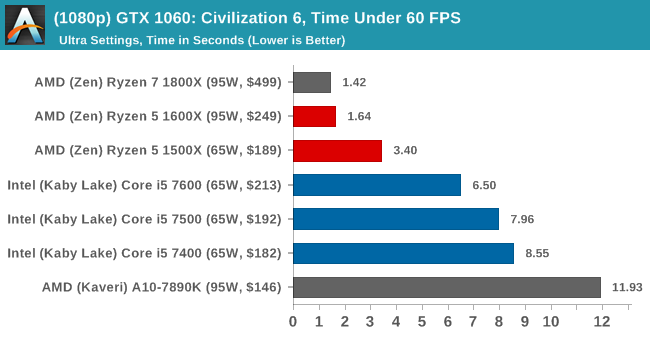
ASUS GTX 1060 at 4K
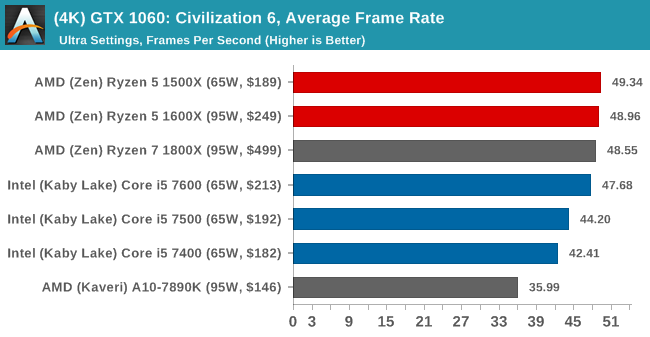
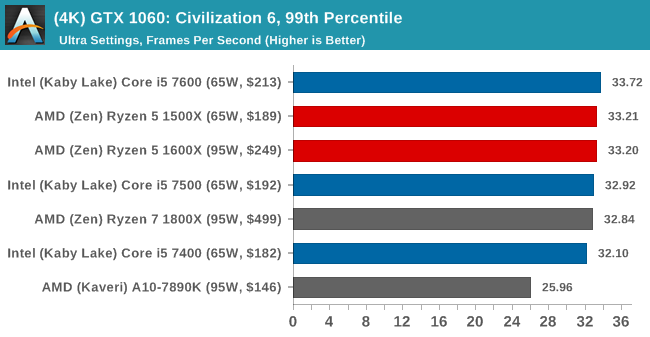
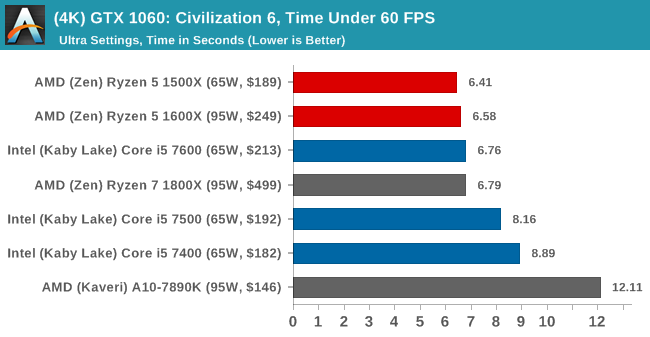
Sapphire R9 Fury at 1920x1080
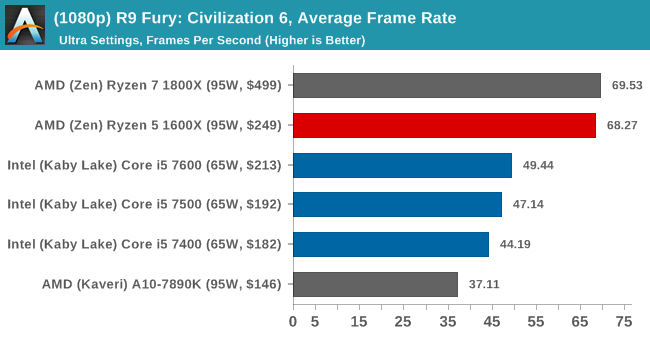
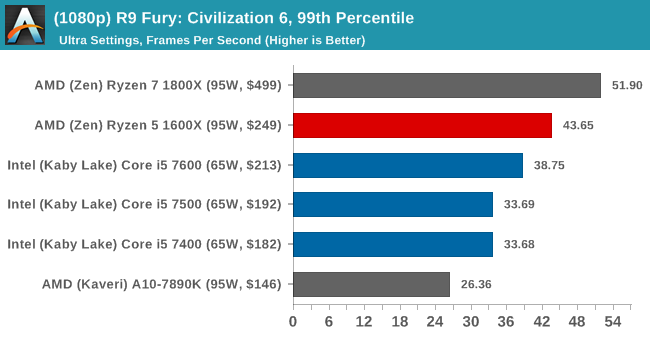
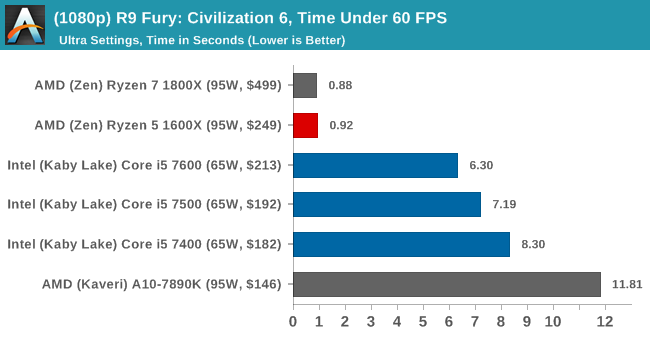
Sapphire R9 Fury at 4K
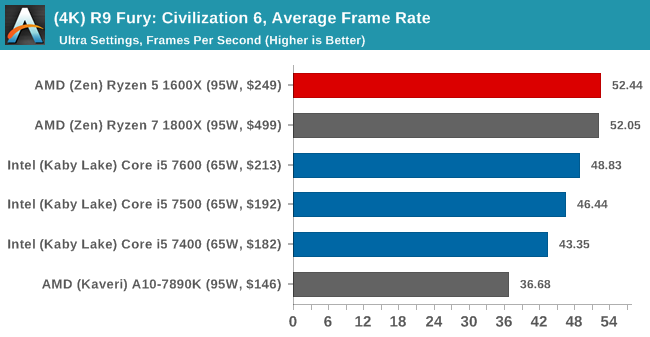
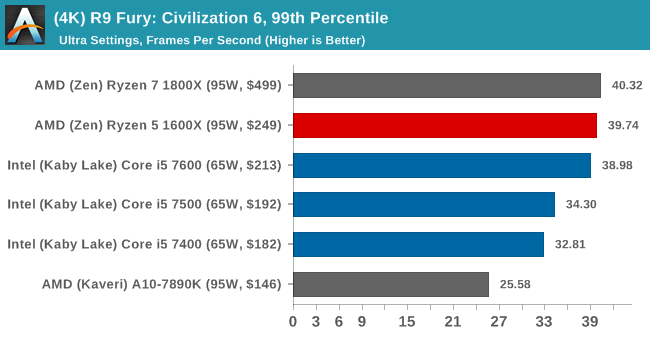
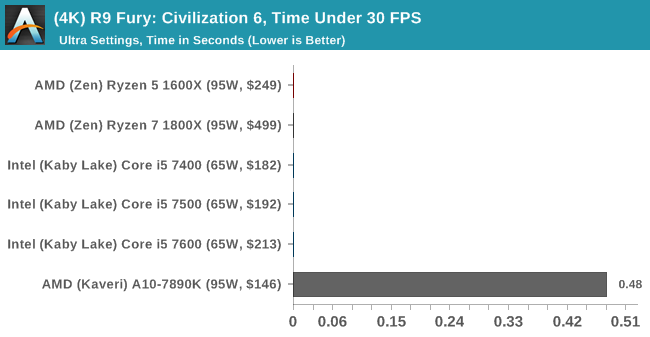
Sapphire RX 480 at 1920x1080
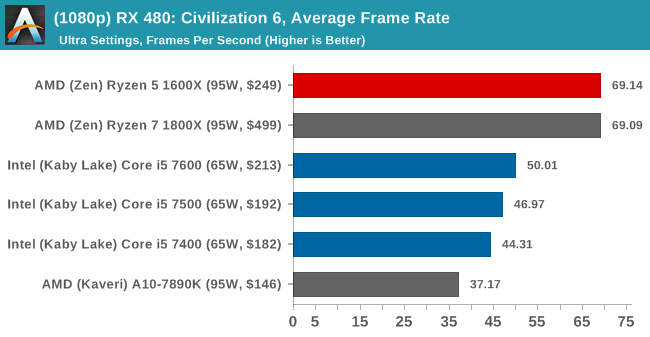
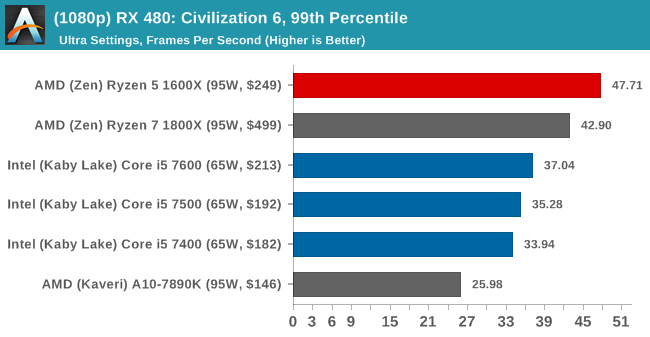
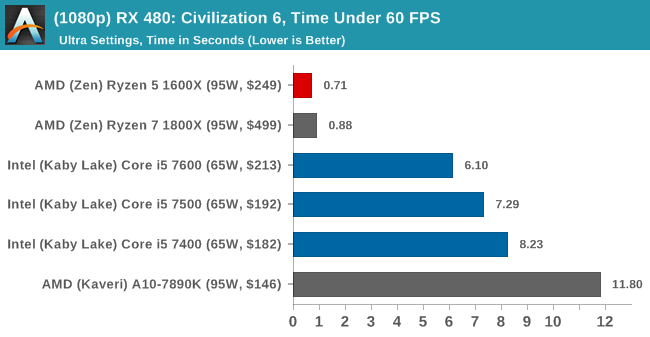
Sapphire RX 480 at 4K
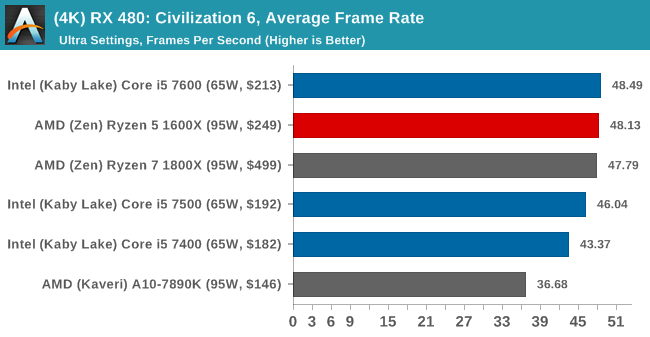
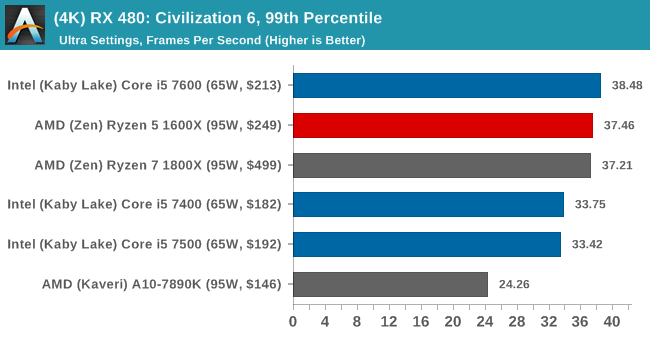
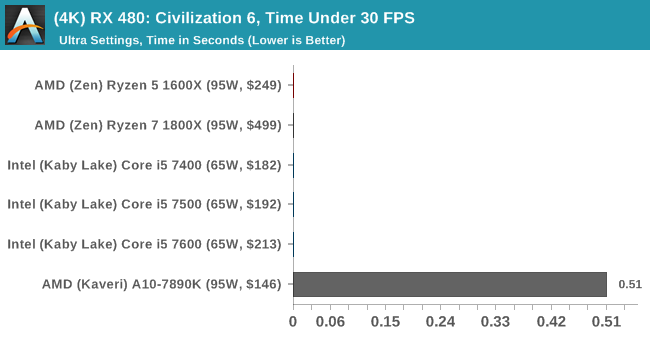



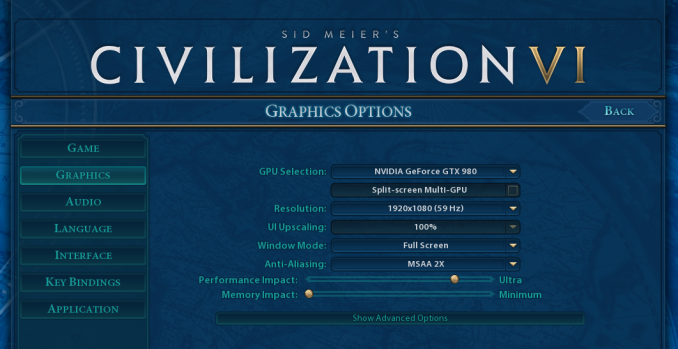








254 Comments
View All Comments
Bp_968 - Sunday, April 16, 2017 - link
This is the point I try to make all the time to console players saying PCs cost too much, require too much upgrading. My i7 970 or 980 (I forget!) Is still playing modern games wonderfully @2560x1440 with a gtx 970. We reciently built a pc for my neighbor out of spare parts and he ended up with a core2 quad (q6600 maybe?) With 6gb ram and a gtx460. He quickly upgraded to a gtx 1050 and now it easily stomps his PS4 (and probably the PS4pro).I'm with one of the previous posters about chipset accessories. It won't be CPU speed that causes me to up upgrade, it will be me wanting access to new features (pcie4, usb-c, usb3.1/3.2, NVMe, Intels ddr/ssd hybrid memory interface, etc etc).
I also expect Intel to respond, at least in the ryzen7 market. I really hope it means Intel will finnally start offering 6-8 core CPUs in non-silly price points.
mmegibb - Tuesday, April 11, 2017 - link
The choice of software hardly matters when what you are looking for is a collection of software that exercises the entire CPU subsystem: the cores, caches, memory, etc. As th3ron mentions, what matters is finding the deltas between CPUs.And yes, in spite of your snobbery, probably 50% of people reading this want to size their system for gaming. Gaming is the limiting case for my home builds.
psychobriggsy - Wednesday, April 12, 2017 - link
Indeed gaming is important for many people.What the reviews show is that for a mixed-use system, the gaming aspect is not significantly behind Intel alternatives (obviously a couple of outliers, but that applies in both directions). However for the other uses, Ryzen is a complete win. It's good enough, rather than the pile of fail that Bulldozer core CPUs were. And indications are that games are getting more multithreaded over time, so buying a 4C product is limiting future gaming.
It's clear that Intel will have to enable SMT in their i5 refreshes this year now, as that should let them claw something back in the 'partial multithreaded' use cases (apps that can't scale indefinitely with extra cores but top out at 4-8 threads).
IanHagen - Tuesday, April 11, 2017 - link
I completely agree on that. I'd love to see more compiling benchmarks too. It's coming to the point where people who are buying a CPU for productivity are taking decisions drawn upon conclusions heavily influenced by gaming performance.RafaelHerschel - Wednesday, April 12, 2017 - link
50% of people use a fast CPU for gaming is a very conservative estimate. For regular office work or for media consumption an inexpensive CPU is fast enough. The current Intel Celeron and Pentium CPUs (or the AMD equivalent) offer much better value for most people. Because of marketing i3 and i5 CPUs sell well.And there are more gamers than professionals who use software that benefits from fast CPUs.
ddriver - Wednesday, April 12, 2017 - link
Dunno about that, of all the people I know who have powerful machines, all do professional work, even those who game. Then again, the selection of my acquaintances has to do with their skills, and I do have to admit I have zero interest in interacting with someone who only plays games.I also know that is 99% of the games on the market cannot utilize 66.66% of that chip.
So you end up putting 50% of the review emphasis on tests that can only utilize 1/3 of the chip.
It is like... testing a sports car and putting 50% of the emphasis on its use as a hearse that will never be used at nowhere near its potential.
mmegibb - Wednesday, April 12, 2017 - link
Man, ddriver, you are an elitist jerk. "I have zero interest in interacting with someone who only plays games". Also, "People who use winrar most likely do not make logical considerations, because if they did, they wouldn't be using garbage like winrar".Why are you like that?
vladx - Wednesday, April 12, 2017 - link
Don't mind ddriver, he's just a pathetic troll who tries too hard.Meteor2 - Wednesday, April 12, 2017 - link
I imagine the proportion of PCs containing higher than i5-7400s bought by consumers used for gaming is much higher than 50%.*Not* talking about business buys here, I'm talking about people spending their own money.
Meteor2 - Wednesday, April 12, 2017 - link
D'oh, I just replied to ddriver. What was I thinking.